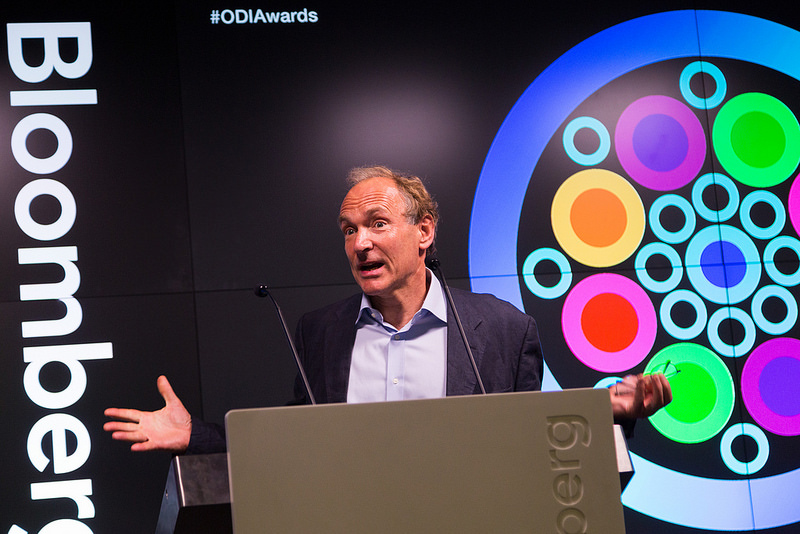Sir Tim Berners-Lee, inventor of the World Wide Web, last night awarded the people and organisations ‘changing the world’ with open data.
The computer scientist founded the Open Data Institute (ODI) in 2012 with Sir Nigel Shadbolt to champion the free exchange of information around the world.
Last night saw the ODI celebrate its second annual Open Data Awards, as 300 delegates convened at Bloomberg London to learn who had made the most impact through open data.
>See also: How open data is transforming the business landscape
From Kenya, Uruguay and Indonesia, to Brussels, Italy, and Ukraine, the ODI received over 500 nominations this year – more than double that of 2014 – reflecting growth across every sector, including industries such as pharmaceuticals, large corporations and finance.
Gavin Starks, CEO at the ODI, congratulated the award winners for their achievements.
“The culture and skills that have developed over the past 25 years of the web have created a generation of network thinkers – people who see and make connections without boundaries to solve problems,” he said.” I see this set of open data leaders as inspirational to our emerging generation of open innovators: Generation Open.”
2015 Open Data Award winners
Open Data Business Award: OpenCorporates
UK startup OpenCorporates has developed the largest open database of company information, with over 85,500,000 organisations worldwide. OpenCorporates provides accurate data about organisations and their structure, providing context to complex company activity.
When we launched OpenCorporates we had a vision for an open database with tens of millions of companies from all over the world,” said Hera Hussain of OpenCorporates. “We’re now in sight of 100 million companies, used regularly by journalists, investigators, governments, even banks. This is a testament not just to the power of OpenCorporates, but of open data itself.”
Open Data Innovation Award: Medicines for Malaria Venture
Medicines for Malaria Venture (MMV), based in Geneva, facilitates open-source development of antimalarial drugs in the pharmaceuticals industry. MMV has launched four new antimalarial drugs, and developed a ‘malaria box’ of 400 open-source antimalarial compounds, freely available to anyone wishing to develop new drugs in developing countries.
“Malaria is one of the most deadly diseases we face, and one that particularly targets small children in Africa and Asia,” said MMV’s chief scientific officer Timothy Wells. “This award reinforces the value that the community as a whole places on our efforts to maintain as much openness and transparency as possible.
“We hope it will catalyse new relationships and partnerships to help us keep transforming the landscape of drug discovery for neglected disease.”
Open Data Social Impact Award: BudgIT
BudgIT is promoting widespread understanding of spending and budgets in Nigerian government through a breakdown of government spending in its portal, whilst also working with citizens to provide further datasets in public demand.
“This is another testament to our idea of ensuring that citizens have equal access to public finance information regardless of their literacy skills or level of interest in governance,” said co-founder Oluseun Onigbinde. “We are glad to be recognised by the ODI and commit ourselves to ensure data transparency and citizen literacy beyond Nigeria and across Africa.”
Open Data Individual Champion Award: Mo McRoberts
Mo McRoberts, chief technical architect at the BBC, has influenced open data integration into the BBC’s portfolio of work. He not only developed an open data platform for the BBC, but best-practices and policies for open data across the entire broadcast industry.
“There’s an awful lot of work still to do before we can really realise the potential of open data at a large scale,” he said, “and I really want to see what happens when that time comes.”
Open Data Publisher Award: Greater London Authority
Greater London Authority has pioneered the release of local and regional government data as open data in London. GLA’s London Datastore publishes 600 datasets with open data certificates to assure quality. GLA’s exemplary work with Transport For London opened up transport data now used in hundreds of third party apps and published the London Schools Atlas.
>See also: The state of open data
“We are entering a new period for open data where supply will broaden out to include other city data partners like utilities and our power to exploit it will increase significantly,” said Andrew Collinge, assistant director at Greater London Authority.
“We are committed to pushing forward the London open data agenda, as well as supporting standards and capacity building. This way, we stand the best possible chance of changing lives and making a difference to the way London is run.”
Open Data Jobs Challenge: Performance in Context (PiC)
PiC, is a platform improving access to jobs for people from less-privileged backgrounds. Using job applicant data against government education data, candidate-provided information and social background algorithms, the platform presents applicant performances in context. PiC enables recruiters to understand, make better-informed recruitment decisions and improve social diversity in jobs.







